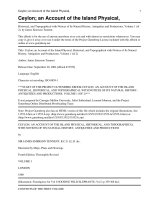You cannot change the past but you can rewrite your memory of it
Bạn đang xem bản rút gọn của tài liệu. Xem và tải ngay bản đầy đủ của tài liệu tại đây (76.24 KB, 2 trang )
You cannot change the past but you can rewrite your memory of it
You cannot change the past
but you can rewrite your
memory of it
Bởi:
Joe Tye
“The most obvious thing about which you can do nothing now is your past behavior.
Everything that you ever did is simply over, and while you can almost always learn from
it, and sometimes change effects that are continuing into the present, you cannot undo
what you have done.”
Wayne Dyer: Pulling Your Own Strings
Every historian knows that the past is largely that which you choose to remember and the way in which you choose to remember it. A history of the Civil War would
have been written very differently by a freed slave and a Confederate general. Any trial
lawyer will tell you that if six different people witness an accident, reports will read as
if it were six different accidents - and if you wait a week and ask again it will read as
another six altogether different accidents.
This has a very real implication for how you remember your own history. In his book
The Soul’s Code, psychologist James Hillman shares research showing that people we
consider to be geniuses often make up their own past by creating fictional memories of
a past that, while it never really happened, is more supportive of where they want to be
in the future than the factual past would have been. For example, a virtuoso violinist
“remembers” having awakened in the middle of every night with a driving desire to
practice, while his or her parents report that child having slept like a stone.
Many of us are held back by negative memories, such as being told by a teacher that,
“You’ll never amount to a hill of beans.” That is a negative and constraining memory.
On the other hand, recalling the teacher having said, “You have so much potential, and
I just know you’re going to do great things once you tap into it,” creates a very different
mindset, even though the essential message is the same.
1/2
You cannot change the past but you can rewrite your memory of it
Remember this: the truth is more important than the facts. The fact might be that the
teacher humiliated you with the former statement, but in all likelihood the truth is that
he or she intended to help you raise your sites and standards. By remembering the past
so as to make it more truthful (even if less factual), you can avoid a great deal of pain
and lay the foundation for a much more magnificent future.
When I’m working with groups we often do an exercise in which everyone carries
around a rock to represent some emotional baggage they’ve been carrying around - in
some cases for decades. We have a ceremony of some sort in which people leave their
rock - and the emotional baggage it represents) - behind. (Click here for a 2-minute
video in which I describe this from the Grand Canyon.)
Some of the most touching experiences have been when someone has the courage to
leave behind scarred memories of childhood abuse. It’s not that they pretend the abuse
never occurred, or even that they forgave the abuser for this most sinful of crimes.
Rather, it means that they’ve promised themselves to no longer allow their lives going
forward to be poisoned by anger, hatred, and shame from the past. They’ve left that rock
behind, stopped hauling it around in the backpack of their lives.
Here are several questions that will help you remember a better past:
What benefits do you gain from hauling around the deadweight of painful memories
from the past (sad but true, it’s human nature to nurse our grievances)?
What other interpretation could you give to painful and disempowering memories? (I
had such an empowering moment when it dawned on me that the teachers who inflicted
what at the time were humiliating punishments for classroom transgressions were really
trying to act in my best interest.)
What positive past experiences can you call up from the recesses of memory and amplify
in such a way that they reinforce your vision of you as your ideal Self pursuing your
most authentic dreams and goals - the way the geniuses in Hillman’s book amplified
their memories of perfection?
If you “remembered” a past that was ideal in every way, how different would your
attitudes and actions be today? Other than the emotional ghost of those ancient
memories, what’s stopping you from being that ideal “Best Self” starting today?
2/2









